
The Poetry of Andalucia
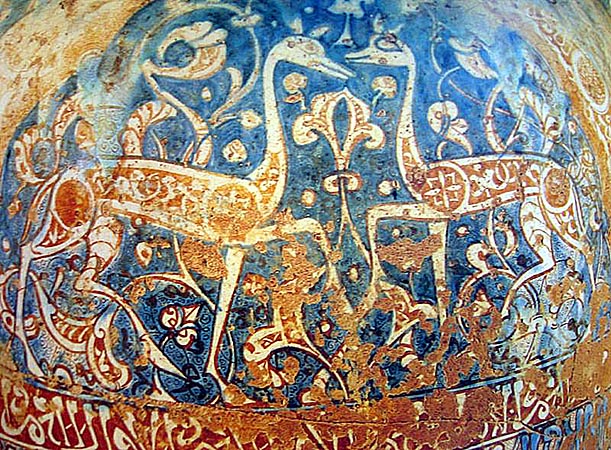
Behind
the charms of Andalucia, its landscapes and towns, its monuments,
mesquites and water gardens lies - only dimly perceived - its Poetry,
the soul of an exceptional symbiosis of three cultures, Arabic,
Jewish and Christian.
Very few of us are able to read Arabic.
A slightly larger number read Sephardic Hebrew. The ordinary reader
has to depend on translations - and most of these are flat-footed and
uninspiring. One reason is that formal Arabic poetry, from which
derives all Andalusian and Mozarabic lyrics of the 9th to 14th
century, uses highly stereo-typed images that are alien to our
Western sensibilities: gazelles, the rosy cheeks amd pearly teeth of
the beloved, and other metaphors which are repeated again and again.
The Andalusian poets and especially the Sephardic ones are, as
Raimond Scheindlin writes, in love with Beauty, some of them with God
in the Sufic sense, very few with a real person, may it be a woman or
a man.
In this situation the slim volume of "Andalusian
Poetry" tranlated into English by Christopher Middleton and
Leticia Garza-Falcón must be considered a felicitous miracle.
Well-remembered Arabic poems suddenly spring into an unimagined,
vibrant life by the choice of their words. This is not the place to
critically analyse their renditions. Neither of them reads Arabic or
Hebrew; they translated from already existing Spanish versions.
Middleton describes this adventure in loving detail.
My
collection of their poems is dedicated to these two people in
gratitude for opening an unimagined treasure to the general reader.
Ibn
'Abd Rabbihi
Cordoba, 860-940


Ahmad
ibn Muhammad ibn `Abd Rabbih was a Moslem writer and poet who
descended from a freed slave of Hisham I, the second Spanish Umayyad
emir. He enjoyed a great reputation for learning and eloquence.
Little is known about his life. He was a friend of many Umayyad
princes and was employed as an official panegyrist at the Umayyad
court. (Wikipedia)
Poem from "Andalusian
Poems" translated by Christopher Middleton & Leticia
Garza-Falcón; D.R. Godine, Pubisher, Boston, 1993.
Photo:
Tile from the Cordoba Mesqita, RWFG
Ibn
Hazm
Cordoba, 994-1063
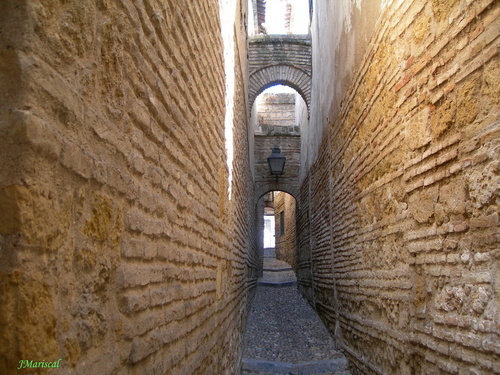
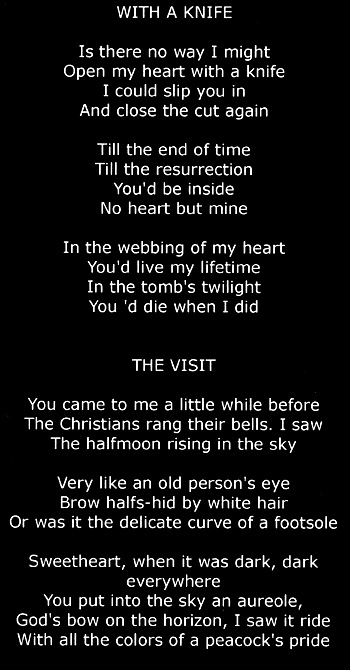
Abu
Muhammad Ali ibn Ahmad ibn Said ibn Hazm was an Andalusian-Arab
philosopher, literateur, psychologist, historian, jurist and
theologian born in Córdoba. He was a leading proponent of the Zahiri
school of Islamic thought and produced a reported 400 works of which
only 40 still survive, covering a range of topics such as Islamic
jurisprudence, logic, history, ethics, comparative religion, and
theology, as well as the "The
Ring of the Dove" on the art of love.
His
grandfather and father both held high positions in the court of the
Umayyad Caliph Hisham II Ibn Hazm served as a minister in the Umayyad
government, under the Caliphs of Córdoba, and was known to have
worked under Al-Mansur Ibn Abi Aamir, Hajib (Grand Vizier) to the
last of the Ummayad caliphs, Hisham III.
After the death of
grand vizier al-Muzaffar in 1008 the Caliphate of Cordoba became
embroiled in a civil war that lasted until 1031 resulting in its
collapse and the emergence of many smaller states called the Taifa's.
Despite that his father died in prison in 1012, Ibn Hazm continued to
support the Umayyads. Homeless, he wandered from Taifa to Taifa and
was frequently imprisoned. He became an embittered apologist of the
ideals of the Cordovan Caliphat. (Commentary modified from Wikipedia)
Poems
from "Andalusian Poems" translated by Christopher Middleton
& Leticia Garza-Falcón; D.R. Godine, Pubisher, Boston, 1993.
Photo of a narrow passage in Cordova by
José Mariscal, Panoramio
Solomon
ibn Gabirol
1021 - 1055, born Malaga, died Valencia


Translated
from the Hebrew by Raymond P. Scheindlin. Excerpted from Maria Rosa
Menocal, “Visions of al-Andalus,” in Menocal et al., eds., The
literature of al-Andalus (Cambridge, 2000)
Gabriol was a
famous physician, philosopher, and poet. Like other Jewish writers he
wrote his treatises in Mozarabic and his poetry in Hebrew
Photo:
The Garden of the Recife, Alhambra, RWFG
Ibn
Zaydun
Medina al-Zahara, 1003-1070
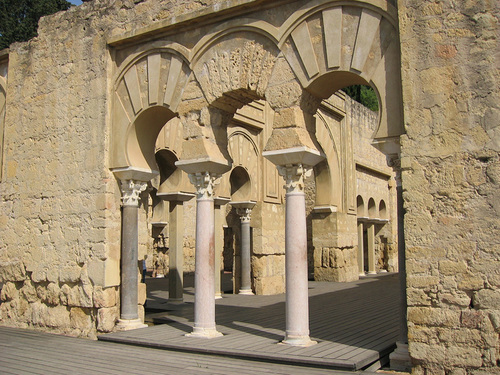
FROM
AL-ZAHARA
With passion from this place
I remember
you.
Horizon clear, limpid
The face of earth, and
wind,
Come twilight, desists,
A tenderness sweeps me
When
I see the silver.
Coiling waterways
Like necklaces
detached
From throats. Delicious those
Days we spent while
fate
Slept. There was peace, I mean,
And us, thieves of
pleasure.
Now only flowers
Withfrost bent stems I see;
At
my eyes their vivid
Centers pull, they gaze
Back at me, seeing
me
Without sleep, and a light
Flickers through their
cups,
In sympathy, I think.
The sun-baked rose-buds
in
Bushes, remember
How their color had lit
Our morning
air; and still
Breaths of wind dispense
At break of day, as
then,
Perfume they gather up
From waterlilies'
Half open
drowsy eyes.
Such fresh memories
Of you these few
things
Waken in my mind. For
Faraway as you are
In this
passion's grip
I persist with a sigh
And pine to be at
one
With you. Please God no
Calm or oblivion
Will occupy
my heart,
Or close it. Listen
To the shiver of wings
At
your side—it is my
Desire, and still, still
I am shaking with
it [...]
Pure love we once exchanged,
It was an
unfenced
Field and we ran there, free
Like horses. But
alone
I now can lay claim
To have kept faith. You left,
Left
this place. In sorrow
To be here again,
l am loving you.
Abu
al-Waleed Ahmad Ibn Zaydún al-Makhzumi was an Arab poet of Cordoba
and Seville. He grew up during the decline of the Umayyad caliphate
and was involved in the political life of his age.
His
romantic and literary life was dominated by his relationship with the
poetess Wallada bint al-Mustakfi, the daughter of the Ummayad Caliph
Muhammad III of Cordoba. For political reasons Princess Wallada
eventually terminated their relationship.
He sought refuge
with Abbad II of Seville and Abbad's son al-Mu'tamid. He was able to
return home for a period after al-Mu'tamid conquered Cordoba. Much of
his life was spent in exile and the themes of lost youth and
nostalgia for his city are present in many of his poems.
Poem
and commentary from "Andalusian Poems" translated by
Christopher Middleton & Leticia Garza-Falcón; D.R. Godine,
Pubisher, Boston, 1993.
Photo of the ruins of al-Zahara: by
marathoniano, Panoramio
Princess
Wallada
Cordoba, 1010 - 1091

FOUR POEMS TO IBN
ZAYDUN
Wait for me whenever darkness falls,
For night I see
contains a secret best.
If the heavens felt this love I feel for
you,
The sun would not shine, nor the moon rise,
Nor would the
stars launch out upon their journey.
***
Must separation
mean we have no way to meet ?
Ay! Lovers all moan about their
troubles.
For me it is a winter not a try sting time,
Crouching
over the hot coals of desire.
If we're apart, nothing can be
otherwise.
How soon just the very thing I feared
Was what my
destiny delivered. Night after night
And separation going on and
on and on,
Nor does my being patient free me from
The shackles
of my longing. Please God
There may be winter rains pelting
copiously down
To irrigate the earth where you now dwell.
Had
you any respect for the love between us,
You would not choose that
slave of mine to love.
From a branch flowering in beauty you
turn
To a branch that bears no fruit.
You know lam the moon at
full,
But worse luck for me
It's Jupiter you have fallen
for.
They'll call you the Hexagon, an epithet
Properly
yours even after you drop dead:
Pederast, pimp, adulterer,
Gigolo,
cuckold, cheat.
Princess
Wallada bint al-Mustakfi was the daughter of Muhammad III of Córdoba,
one of the last Umayyad Cordoban caliphs, who came to power in 1024
after assassinating the previous caliph Abderraman V, he was
assassinated himself two years later in Uclés.
She spent her
early childhood during the high period of the Caliphate of Córdoba,
under the rule of Al-Mansur Ibn Abi Aamir. Her adolescent years came
during the tumultuous period following the eventual succession of
Aamir's son Sanchuelo, who in his attempts to seize power from Hisham
II, plunged the caliphate into civil war.
As Muhammad III had
no male heir, Wallada inherited his properties, and used them to open
a palace and literary hall in Córdoba. There she offered instruction
in poetry and the arts of love to women of all classes, from those of
noble birth to slaves purchased by Wallada herself. Some of the great
poets and intellectuals of the time were enamored with her.
Poems
from "Andalusian Poems" translated by Christopher Middleton
& Leticia Garza-Falcón; D.R. Godine, Pubisher, Boston, 1993.
The unususal photo of the Cordova Mesquita is from Archives
of Affad Shaikh's Islam Blog
Abu
Bakr Muhammad ibn 'Abd al-Malik ibn Guzman
Cordoba, c. 1086-1160
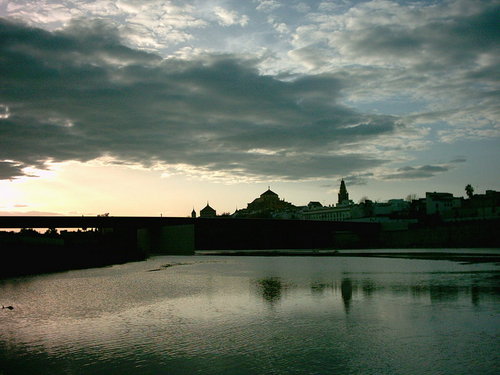
ZAKHAL TO UMM AL-HAKAM
How
could I not be sad, living apart
From her, if Umm al 'Hakam kept
my heart ?
Faithful to her, it never quits her side.
Each
day I'm gone is longer than a month.
I've lost my occupation, lost
my moon.
The moment I forsook her, sorrows came.
A seething
lonesomeness deep down inside.
Queen of the world, to her I should
return.
Years and months pass by and they are gone.
My love for
Umm al^Hakam does not pass.
Among her neighbors, rightly she
may boast:
Her skin the tint of pomegranate flowers,
Her eyes
so large, their concentrated dark
Spellbinds anyone, or leaves its
scars.
Her kiss, 0 what a sweetness in its taste.
That
little mouth, subtle and fine her lips:
Forget, I tell myself, no
pact they sealed:
Remember times we lived as one, at peace.
Be
true and constant (as your lover is).
Stay home; and please, if
you go out, go veiled.
Anyone who speaks well of me,
believe.
Don't credit any gossip from the crones.
My
messenger will come, receive him well.
If you can stoop to write a
letter, then
I will break off a bone to be my pen,
And write
with it, in blood, a fit reply.
TO A BEAUTY, WHITE, PURE, AND
CONSTANT
Girl, you cut me up inside:
To you my torment I
confide.
Longing to blend our sighs
Night after night I've
spent
And could not close my eyes:
That you for me are
meant
God's writ does recognize—
Leastways my large
intent.
Yes you're my lucky star:
On days I see you
pass,
Your features luminous,
If you are glad, my soul,
Seeing
my flower afar
I'm filled with happiness.
Beauty, your
slave is it ?
Or captive? Out you go
And over flowers
tread.
Your little bed you quit,
A light that fills your
room
Spreads through your barrio.
Dawn of your look! My
eyes
Answer that early light;
My myrtle tree, my wine—
If
nothing suits you quite,
If nothing satisfies,
What misery is
mine.
A lover living still,
Fortune exalts him most;
If
death became his fate—
One look from you could kill—
Has
not the ghost of a
Chance to retaliate.
"Hold up,"
is what they say,
"Patience, endure, be strong."
This
patience, is it, pray,
Circular ? Is it long ?
Its color green,
I ask,
Or yellow as aloe husk ?
Hard labor is this
love,
Distressing its ordeal.
Now I am skin and bone,
My
wardrobe down-at-heel,
Share with me, if you can,
One third of
what I feel.
If lam counting right,
Three gifts of God
secure
No woman, quite, like you:
A being that is white,
A
being that is pure,
A being constant too.
DISPARAGERS
OF LOVE
Disparagers of love, now hear my
song;
Though you be of a mind to do love wrong,
Believe me,
moonlight is the stuff whereof
My lady's limbs are made. I offer
proof.
Something I saw, full moon in her, alive,
Cool in her
balanced body, took me captive;
Her beauty, young, her anklets,
with a thrill
They pierced my heart, to cause my every ill.
A
lover is a man amazed. Desire
Can drive him mad the moment he's on
fire;
Heartsick, when he has had the thing he wants;
Worse, if
he's deceived by what enchants.
A lover knows he's not the only
one.
His lady's garden gate, she keeps it open:
A
challenge—passion hurts him even more.
Whom will she choose ?
Whom will she ignore ?
I'm of a kind a woman's body charms
So
to the quick, it's Eden in her arms:
Absolute beauty being all we
seek,
We can be melted by a touch of magic.
As for the moon, so
for the sun : from both
She draws her power; moon pearls grace her
mouth,
Solar fire crimsons her lips, and yet
She's not
ambiguous when her heart is set:
Burning in my reflections, day by
day,
In every act of mine she has her say;
Even when, if ever,
she's at peace,
You'll never find her supine in the least.
Such
is my proven moon, my lady love.
Yet of myself she did once
disapprove:
Pointing to the marks my teeth had made
Across her
breast, then eyeing me, she said:
"Easy does it, not too
quick,
I like it slow, and nothing new.
Custom knows a thing or
two,
It's to custom we should stick:
Festina lente, that's the
trick—
Come at me slow, I'll come with you."
Poems
from "Andalusian Poems" translated by Christopher Middleton
& Leticia Garza-Falcón; D.R. Godine, Pubisher, Boston, 1993.
For a biographical sketch see Medieval
Iberia: An Encyclopedia, by E. Michael Gerli, Samuel G. Armistead
Published by Taylor & Francis, 2003
Photo of Cordova
from the river by José
Mariscal, Panoramio
Al-Mu'tamid
Seville,
1040-1095
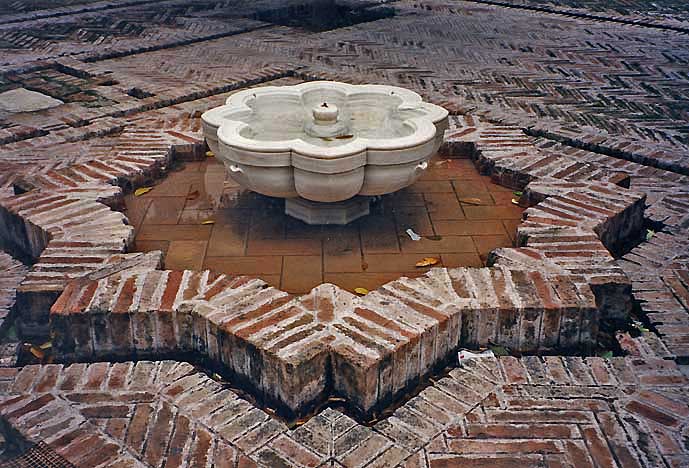
TO
ABU BAKR IBN AMMAR
GOING TO SILVES
When you come to Silves, Abu
Bakr, my friend,
Greet with my burning love the spirits who
dwell
In that place, and ask if any remember me.
Say this young
man still sighs for the white palace,
The Alcazar of Lattices,
where men like lions,
Warriors live, as in a wild beast's den,
And
in soft boudoirs women who are beautiful.
Sheltered under the wing
of darkness,
How many nights I spent with girls there.
Slender
at the waist, hips round and abundant,
Tawny hair or golden,
deeper than a sword blade
Or black lance their charms would run me
through.
How many nights, too, in the river's loop I spent
With
a graceful slave girl for my companion;
The curve of her bracelet
imitated the river.
She poured out for me the wine of her eyes;
Or
again the wine of her nook she poured for me;
Another time it was
the wine of her lips she poured.
When her white fingers played
among lute strings,
I felt a thrill as when a sword hits and
clips
Clean through the sinews of a foe in combat.
When with a
languid look she'd shake off her robe,
Like a ray of light
surrendering her body was.
The very air around her shivered with
desire.
It was a rose opening out of a rosebud.
TO
RUMAYKIYYA
The heart beats on - and will not stop;
passion
is large - and does not hide:
fears come down - like drops of
rain;
the body is scorched - and turns yellow:
if this is it -
when she is with me,
how would it be - if we 're apart ?
By
her indifference - I am broken:
dark-eyed gazelle - among her
leafage,
stars that burn - on her horizon,
depth of night -
shining moon,
rock, then jonquil - in her garden,
bushes too -
that spread perfume,
all know me downcast, - wasted as a man,
and
are concerned - by my appearance,
how it mirrors - my state of
mind;
they ask if I - may not be well,
flaming desire - might
burn me out.
Woman, you do - your lover wrong
that he
should look - as you 've been told.
You say : "What hurts ? -
What's going on ?
What do you want - but cannot wait for ?
You're
less than just - to doubt my love,
everyone knows it, - here or
distant".
God! I am sick, - sick with the love
that
makes, beside you, - others puny.
My body frets. - Give thought to
this:
I want to see you - and I cannot.
Injustice calls - to
God for pardon:
ask him to pardon - your injustice.
'AMMAR'S
KINSMEN
The most mighty lords and sovereigns
The crowned
heads of bygone time
Those who had more incense than they had
smoke
Burning only the former when they bivouacked on the
road
Those who alleviated their kin with largesse
Those who
decapitated tyrants
Those who from the cradle coveted glory
Those
who contended in battle after battle
Take their size and they have
no measure
Compare them and they alone were like
emperors
Noble
Place hope in them and see your hope
accomplished
Live close to them and be their most
Fortunate
neighbor
Shannabus weeps for them
With tears crashing like
waves
And the lofty palace with balconies
Glittering in
arboreal green
Weeps for Shannabus
No sun laughs there unless
you fancy
Gold water washing its facades
The singers whose
lutes sound in yards
Weep
In those yards while birds chirp.
0
palace in splendor how did the blows of Destiny
Undo you ?
You
house no nations though tough barons
Fought their way through your
tall walls
What lions were leaping up to guard the gates
With
lance and sword defending you
How many men of handsome
appearance in combat
Had their white features covered with cloaks
of black pitch
How many brave men sank in the turmoil
Facing
their foe in fire's heat
When the glory of'Ammar's tribe was
waxing
Making the lifespan of his foes a whole lot littler ?
This
satire ridicules the vainglory of Ibn Ammar (who was nine years older
than Al-Mu'tamid and might well, earlier on, have been his lover).
Shannabus was a village on the outskirts of Seville, and Ibn Ammar
came from humble origins. Over the years Al-Mu'tamid exchanged
several satires with him, before eventually killing him, in a fit of
rage, with a battle-axe.
Poems
and commentary from "Andalusian Poems" translated by
Christopher Middleton & Leticia Garza-Falcón; D.R. Godine,
Pubisher, Boston, 1993.
Photo of an Islamic fountain in the
Garden of Oranges of the Cathedral of Seville, RWFG
On
the subject of homosexualty in Al-Andalus see "Medieval
Iberia: An Encyclopedia", by E. Michael Gerli, Samuel G.
Armistead
Jehuda
ben Halevi
1085 - 1140, born Toledo, lived in Granada
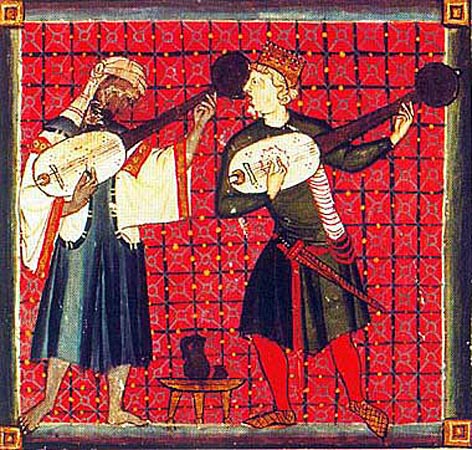
PEACE
BE WITH HIM
Peace be with him
whose joys belong
now
Somewhere else,
whose comforters
Have left him
Like
an oven, hot
my heart, for Joseph
Is not here. And at
Yehuda's
death
I know
my own destruction.
The other
brother's
grief
Grows into mine.
His bitter sorrow
Clings to my
soul.
My heart's walls
Like his, are broken.
I would
give my soul
to bring Senor Moise
Some relief.
I too will
not cease
Weeping.
Calamities of
The hard vision
descended
on us all,
No end of them,
light as an eagle
Once, now
consuming,
so heavily, me,
Your friend.
One
calamity
inflicts on us
Despair now. In
visionary sleep
I
will see him
still. Others
And brothers
I will be mindful
of,
But him I'll see
here no more.
I lift up my eyes,
in
heaven find him,
An angel of God,
before me, revealed.
Ay!
The good man
has been shut
Into the dust.
We put the lights
out.
Pleasure ceases,
as if the next thing
Stopped. As if
a
great rain, without
Forewarning,
stopped. I want
To see his
lights.
They shine no more.
Spark
in my memory
The
song
of the brother bereaved:
He sings
the song of a girl,
her
Heart throbs
wild, the moment
Has come, but
her lover
has not:
"He should have come,
it's Easter. He has
not.
First a hope is broken,
then a heart."
Poem
from "Andalusian Poems" translated by Christopher Middleton
& Leticia Garza-Falcón; D.R. Godine, Pubisher, Boston, 1993.
FAIR-CRESTED
COSMIC JOY
Fair-crested, cosmic joy, city of the great
King,
My soul yearns for you from the edge of the West.
My
yearning love is stirred when I remember the East of yore,
Your
Glory exiled, your Shrine ruined.
Would that I were borne to you
on eagle's wings
So I could drench your dust with my tears until
they blend.
I seek you even though your King is away, and in
place of
Your balm of Gilead are venomous snakes and scorpions.
Shall I not cherish and kiss your stones,
The taste of your
clods sweeter to my mouth than honey?
Translated
from the Hebrew by Ross Brann and excerpted in idem, “Judah
Halevi,” in Menocal et al., eds., The literature of al-Andalus.
MY
HEART IS IN THE EAST
My heart is in the East but I am at the
edge of the West.
How can I savor what I eat, how find it sweet?
How can I fulfill my vows and obligations while
Zion is in
Christendom's fetter and I am in the shackle of Islam?
It would
be easy for me to leave behind all the opulence of Spain;
It would
be glorious for me to see the dust of the ruined Shrine!
TO
THE WESTERN WIND
This wind of yours, O West, is all
perfume
-- it has the scent of spikenard
and apple in its wings. Wind, you
come
from the storehouse of spice-merchants,
and not from the
common storehouse
of winds. You lift up the swallow's
wings,
you set me free, you are like the
purest perfume, fresh from a
bunch of
myrrh. Everyone here longs for you; by
your good
graces, they ride over the sea
upon a mere plank. Oh, do not
abandon
the ship, when the day draws to its end
or when it
begins. Smooth out the
ocean, break a path through the sea
until
you reach the holy mountains, and
there subside. Rebuke the east
wind
that whips up the sea and turns it into
a boiling
cauldron.
But how can the wind help, for it is a
prisoner of
the Rock -- sometimes held
back and sometimes let loose? Only
God
can grant my deepest wish: for He
is the maker of high mountains
and
the creator of winds!
Translated
from the Hebrew by T. Carmi, in The Penguin Book of Hebrew Verse (New
York, 1981): 350-51.
COMELY
GAZELLE
Comely gazelle
pity my heart
forever it dwells
in you;
Give this a thought:
your distance now
is my
misfortune.
Truly my eyes have
trouble enough, still
dazed
by your splendor;
Fanged snakes
hatched from your cheeks
sprang
at me, stung.
Breasts of hers
hold me in thrall:
from her
heart of stone
Two apples grown
hard to the core, or stood
like
lances akimbo,
Herfresfar off
ablaze in me, drink
my blood
through her mouth.
Small though she be,
gazelle, her eyes
frank
as you please
Breaking religion's
back. God's laws, me—
I
am beyond help.
Have you looked
info a lions heart ? Well,
her
eyelid has
Such puissance
at kill, her piercing arrow glance
hits bone.
One day, with wine,
with love, like a drunk
I
cried out for joy:
There she stood,
actual, in the shape
of
certain messages.
Three times I heard,
or twice, from her
delegates;
peace on the table,
Her terms utterly
swept me
away, her favor
gave me fresh spirit.
One day in a garden
my
hands in air brushed
over her breasts'.
Coaxing, plunging
me
into dismay then, "No," she said:
"Amigo, do
not touch, this tender bodikin,
still it is such
a fragile
thing."
Poem
from "Andalusian Poems" translated by Christopher Middleton
& Leticia Garza-Falcón; D.R. Godine, Pubisher, Boston, 1993.
Photo: Andalusian miniature of an Arab and a Jew playing the
lute, RWFG
Ibn
Sara
Born in Santarém, Portugal
1043-1123
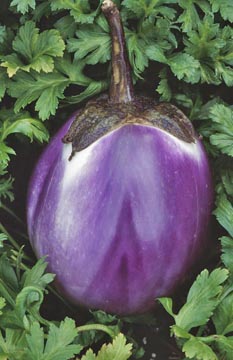

Poem
facsimile from "Andalusian Poems" translated by Christopher
Middleton & Leticia Garza-Falcón; D.R. Godine, Pubisher, Boston,
1993.
Ibn
az-Zaqqaq
Valencia, c. 1095-1133

DRUNKEN
BEAUTY
Her
beauty, luminous and singular,
The carefree splendor of it made my
day.
She gave me wine to drink: it was her mouth
Intoxicated
me. The crystal held
Ambrosia, her lips their pearls;
Glistening
liquid.
Her rosy cheeks gave off an airy glow,
I kissed and
kissed them, till, the frenzy over,
She was a slender branch the
breeze has bent;
I gave my shoulder to her for a pillow,
My
arms around her held the surge of dawn.
Poems
from "Andalusian Poems" by Christopher Middleton &
Leticia Garza-Falcón; D.R. Godine, Pubisher, Boston, 1993.
Photo:
The Alhambra at dawn, from bareka.com.
Abu
Ja'far Ahmad ibn Sa'id
Granada, d. 1163

THE
PROCURESS
The
procuress, said to be a bad lot
and she's proud of it
More
close than night a man on the road
she'll hug a secret
Tiptoes
into anyone's home,
how far inside, nobody knows
Polite, with a
nod for everyone
and a kind word along with it
Back and forth
she scuttles,
no bother to folks next door
Never a second to
fold her cloak,
it outflaps any battle flag
Can tell a crime
from a crafty trick
so long as she finds it useful to
No idea
where the mosque is
but knows the taverns inside out
Forever
smiling, very devout,
jokes and tales up every sleeve
Arithmetic
at her fingertips,
abracadabras, horoscopes
Never a cent for
shoes of her own
but well-off where most are not
Her palaver so
smooth
she'd matchmake water and fire in a wink.
***
Poems
from "Andalusian Poems" by Christopher Middleton &
Leticia Garza-Falcón; D.R. Godine, Pubisher, Boston, 1993.
Photo:
Luminous house in the Albaicin, RWFG
Abu'l
Qasim As'ad ibn Billita
Toledo, 11th century

THE
ROOSTER
Up
he stands
To declare the darkness done for
The bird trimmed
with a poppy
Who rolls his lustrous eyes for us
With song
he calls to prayer
And he complies with his call
Beating his
great plumes
Flexing his shoulder knuckles
The Emperor of
Persia
Perhaps wove his crown
Personally Mary the Copt
Hung
pendant rings from his ears
He snatched from the peacock
His
most attractive cloak
And still not comforted took
His strut
from a duck
Poem
from "Andalusian Poems" translated by Christopher Middleton
& Leticia Garza-Falcón; D.R. Godine, Pubisher, Boston, 1993.
Photo Andalusian miniature of a fiddler and a dancer ready to
kill the rooster of desire.
Abu'l
Hasan 'AII ibn Hisn
Seville, 11th century

THE DOVE
The
surprise of my life:
On a bough between
Isle and river a
dove
Cooing, his collar
Pistache green, lapis his
breast,
Neck shimmering and maroon
His back and
wingtips.
Pupils of ruby, over them eyelids
Of pearl flitted,
trimmed with gold,
Black the point
Of his beak, like
The
tip of a reed
Dipped in ink. On the arak bough,
His throne,
throat now hid
In the fold of a wing, he rested.
But he saw
me weep.
Scared by a sob
On the bough he stood,
Spread
wings, beat them,
Took as he flew my heart away.
Where ? I
know not.
REFLECTION
OF WINE
Light
will pass
Through wine
A red
Shine
On fingers
Forked
at the stem
Of the glass they bring
To antelope horns
A
juniper pins down
I liken them
Poems
from "Andalusian Poems" by Christopher Middleton &
Leticia Garza-Falcón; D.R. Godine, Pubisher, Boston, 1993.
Photo:
Courtyard in Seville, from Panoramio.
Hafsa
Bint Al-Hajj Ar-Rakuniyya
Granada 1135-1191, died Marrakesh
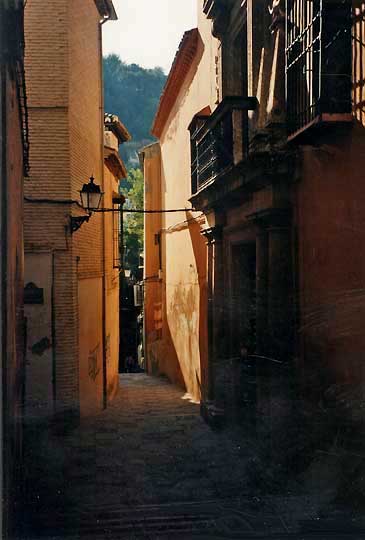
O NOBLE SON OF THE
CALIPH
0 noble son of the Caliph,
of
the most excellent imam,
a festival to celebrate yourself
brings
what you desire.
She whom you love comes to visit you,
combining
ceremony with satisfaction,
and to recapture
pleasures lost and
past.
***
Perhaps
this poem and the next were written after 1162, for to Abu Ja'far she
writes:
***
You come first, but
enemies,
unjust men who know more and more,
continually say
that you do not.
He who has power over other men of his
time-
seekers of glory who stop at nothing—
can he be ignored
?
***
When
nineteen (1154) Hafsa, a slave girl, had begun a celebrated love
affair with the poet Abu Ja'far Ahmad ibn Malik ibn Saí'd. Two years
later she fell in love with the young governor of Granada, a
dark-skinned, very young man. Hafsa is justifying her interest in the
governor, whose full name was Abu Sa'id 'Utman ibn Abd al-Mu'min. But
Abu Ja'far, though a gallant himself, must have been jealous.
To
make matters worse, he was 'Utman's secretary, his privy councillor.
The two poems epitomize a dangerous scene: the Almohade governor,
'Utman, still young, his position fragile; Abu Ja'far resenting him
for reasons political and personal; Hafsa trying to protect Abu
Ja'far, while cultivating 'Utman for whatever allures (charm, power,
liberality) she might have divined in him.
In 1162 there is a
crisis: the Almohade power in Granada is overthrown for a few months
by rebel forces led by Ibn Mardanis. The crisis over and Almohade
authority restored, Abu Ja'far's father, who had opposed the
Alrnohades (and whose brother had been governor of Granada under the
previous Almoravide regime) is duly thrown into prison. During the
coup, Abu Ja'far himself would have gone over to the rebels.
To
none of the following poems (first Abu Ja'far's, then poems 7 through
16) can we assign exact dates within the political scene suggested by
Hafsa's poems 3 and 4. (omitted, see reference below). All together,
however, they indicate a convergence of interests that are by no
means ghostly. Passion and politics are set on a collision course.
Abu
Ja'far writes to Hafsa about a night in the park called Hawr
Mu'ammal:
(6)
May
God watch over a night spent without anyone watching,
A night
which hid us in the Hawr Mu'ammal.
From Nayd an aroma was wafted
over,
Shivering with the scent of carnations.
A turtle dove was
cooing in the trees.
Myrtle branches stooped over the stream.
And
the garden was as if delighted
By what was present: embraces,
kisses, caresses.
Hafsa
replies with a counterpoem:
(7)
By
your life! The garden was not glad because we met.
Rather it
showed us rancor and envy.
The river did not clap its hands to
have us close,
And the dove sang of its aches and pains.
You're
not thinking straight for once:
Everywhere those people are up to
no good.
I think the sky showed us its stars
Only to spy on us.
The
order in which poems 8 through 15 were written is not known, but 16
and 17 can be assumed to be the last two. Hafsa's phrasing remains
conventional enough. Her own voice, however, her pulse, the urgency
of her feelings, become increasingly poignant as the political
situation worsens.
She would also have known in advance the
dangers besetting Abu Ja'far's entire family: his brother, Abd al
Rahman, actually joined Ibn Mahdanis after the revolt had been put
down, but was captured, imprisoned for a time, then executed.
(8)
Those
lips I praise because I know
What I am saying, what I mean.
I
do them justice, tell no lies.
From them I've drunk and what I
drank
Tasted better than any wine.
(9)
Come
and see my verses
Be thrilled by their pearls
Which will adorn
your ears
It is the way a garden
Cannot go to you
But sends
you its perfume
(10)
I
am sending my message:
It opens the cups of the flowers
And
makes the doves speak in the trees
As it goes to a distant friend
who dwells
In my very body
Although my eyes have no sight of
him.
Do not think that absence makes me forget you.
God, that
will never happen.
(11)
If
he were not a star,
Eyes that enjoyed his glow,
Would shadow
shroud them so,
Now he is far ?
i Salud '.from one who's
sad,
Yet may it still address
Virtues and powers above,
Which
as they onward move
Took from me all I had
Of fortune,
happiness.
(12)
In
the still of the night
Ask the cloud with its beating heart
If
it has spent the night with my love, remembering me:
Ay, it has
given my heart
Its heat and, heavens above,
Given the lids of
my eyes this rain
That pours down my cheeks.
(13)
Shall
I come to you or will it be my place ?
My heart always gives in to
your desire.
You will Ie safe from the sun's heat,
And you will
not be thirsty
When you make me welcome:
My lips are water
sweet and fresh,
And the branches of my braids give deep
shade.
Answer me now: you'll be doing her no favor, Yamil,
If
you do what your Butayna is waiting for.
[The
names allude to the classic Arabic 'udri ("Platonic") poet
Yamil and his beloved—exemplars of spiritual love.]
(14)
The
throat of a gazelle has come to visit you
Under the black of its
hair the moon appears
Its eyes took shape when Babylon was
enchanted
Its saliva surpasses wine
Its cheeks put roses to
shame
Its teeth have eclipsed pearls
(15)
0
you who used to be the most sensitive of men
Before fate lifted
you up to let you fall
In love with a black woman
Who is
altogether like the night, which hides beauty
And with darkness
obscures the radiance of a face,
Nor in that night can any blond
thing be seen,
Tell me, you being so well acquainted
With
connoisseurs of extrinsic beauty,
By God, would anyone ever fall
in love with a garden
Where no roses are, nor blossoms of the
orange tree ?
(l6)
I
will keep you jealously
where no spies can see you
And from
yourself, your time
and from the place you live
And though till
the crack of doom
I hide you in my eyes
Still it will not be
enough for me.
(17)
They
threaten me because I wear mourning
For a lover of mine they put
to death.
God have mercy on anyone who is liberal with
tears
Weeping for a man slaughtered by his rivals,
And may the
clouds of the afternoon,
With such generosity as was his,
Water
the earth wherever she may go.
Photo:
narrow lane near the Islamic Baths, Albaicin, Granada, RWFG
Text
and poems from "Andalusian Poems" by Christopher Middleton
& Leticia Garza-Falcón; D.R. Godine, Pubisher, Boston, 1993.
Ibn
at-Talla'
full
name:
Abu-l-Walid
Hisam ibn Muhammad al-Qais ibn at-Talla as-Silbi
Granada and
Silves, Portugal
12th century
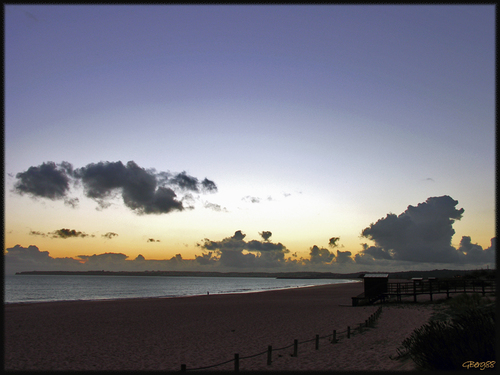
ARTICHOKE
HEART
Of
earth and water, daughter
Yielding her abundance
Only if you
wait
Finger-licking at her castle gate
Pale she seems, her
haven
Hard of access, a Greek
Virgin, who lingers
Behind a
curtain of lances
Talla',
a friend of Al-Mu'tamid, was a Mahdi, a religious/political refugee
from Granada during the uprising against the Berber rule in 1162. He
was beheaded in Silves after the revolt failed. (see Hafsa
Ar-Rakuniyya in Granada)
Poems
from "Andalusian Poems" by Christopher Middleton &
Leticia Garza-Falcón; D.R. Godine, Pubisher, Boston, 1993.
Photo:
Sunset over the Mediterranean near Silves where many refugees fled
to. by GBerg88,
Panoramio
Ar-Radi
Ronda,
11th. -12th century
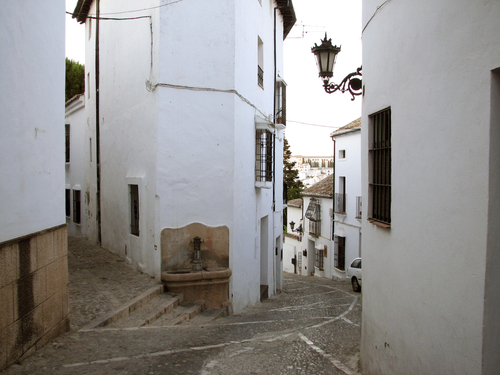
THEIR
PASSING
Night
was falling;
Without forewarning, close
They passed me by
And
lit my fire,
And how
It is not strange at all
That my
desire
Was so excited.
When he sees water
A person
thirsting
Thirsts the more
Ar-Radi
was a woman poet.
***
Poems
from "Andalusian Poems" by Christopher Middleton &
Leticia Garza-Falcón; D.R. Godine, Pubisher, Boston, 1993.
Photo:
Turn in the narrow lanes of Ronda, by
Victoria Babadzhanova, Panoramio
Qasmuna
bint Isma'il al-Yahudi
Granada, l2th century

UNA
PIEDAD NUEVA
(Desde
el sur que hay en tus ojos de mestiza)
Inundado,
poseído por
siglos de ternura,
de nombres y miradas,
arrastrado por un
vendaval de tierra húmeda.
Tan prendado de ti
que no puedo
dejar de mirarte
y besarte
y rozarme con tu cuerpo.
Cimbreado
como una caña de mimbre,
con una columna de Vida
desbordante
atravesándome desde el pecho a la espalda,
escribo
para ellos,
los que nunca han sido despertados
por gritos que
hayan arrancado cortinas
y desgarrado las gargantas más
fuertes
en una lengua tan antigua y profunda
como la luz de la
mañana.
Sorprendido porque me has abierto cerrojos
de arcas
tan pequeñas
que ni yo mismo podía saber que existían.
Sintiendo
como con la suavidad de tu cuello
me cubres el cuerpo de
aceite,
como la blancura de tu piel
me penetra entre caricias
de alhucema e incienso.
Convirtiéndome con tus besos recién
nacidos
en el primer pecado del mundo,
en el primer loco
suicida,
en la primera manzana mordida por Eva.
Con tus manos
de halcón agarrándose a mi alma,
escribo para ellos,
los que
nunca han conocido la verdad
de una mujer de fuego y poder como
tú,
los que nunca han sabido descubrir la hondura
de las
palabras pequeñas de una niña
-como tú-
susurradas al
oído.
Porque me siento libre como el Azor
que se lanza desde
el monte a peinar la vega.
Porque puedo ir de un lugar a otro
con
mis alas de hombre jugando a escondidas
en la palma de mis
manos.
Porque me encuentro en tus espejos más profundos,
escribo
para ellos:
quiero que saboreen cómo eres,
que aprendan a
resucitar juntos
cada rincón de su cuerpo.
Pongo por
testigo
-para que nadie se lleve a engaño-
a este aire añejo
que nos da la Vida
y nos ha cargado los hombros de historia,
al
río del que beben tu gente y la mía,
al aroma del romero y la
naranja amarga,
de que tenerte,
le provoca a mi alma de hombre
una piedad nueva,
un deseo de entrega absoluta,
una necesidad
de arrodillarse y cantar una letanía
-que sin parar repitan
todos-
por oración:
mujer con el sur en tus ojos de
mestiza,
volvamos a hacer el amor con las palabras.
Mujer con
sabor a tierra en las manos,
volvamos a soñar el amor con las
palabras.
Mujer con un nombre secreto
que habla de tesoros
escondidos,
que descifra el misterio de tu belleza
antigua,
volvamos a decir el amor con las palabras.
Mujer de
raíz profunda y salvaje,
niña hermosa de sangre de acebuche,
volvamos a fundir el amor con las palabras.
Mujer de olores dulces
y primitivos a aserrín de encina,
a ajonjolí,
a casa de
abuela y pueblo,
volvamos a jugar el amor con las palabras.
Mujer
luz de paraíso
que derramas Vida en cada entrega,
volvamos a
abrir el amor con las palabras...
This
is an example of the Spanish version of Qasmuna.
SEEING
HERSELF BEAUTIFUL AND NUBILE
I
see an orchard
Where the time has come
For harvesting,
But I
do not see
A gardener reaching out a hand
Toward its
fruits.
Youth goes, vanishing; I wait alone
For somebody I do
not wish to name
TO
AN ANTELOPE BELIEVING
ITSELF AT HOME
Ay,
antelope, always grazing
In this garden, how like you I
am,
Dark-eyed and solitary;
You and me, alone, without a
friend,
Let us endure the life
Our fates decree,
With
patience.
Qasmuna,
one of the few Jewish female poets had only a brief meteoric streak
across the Andalusian literary scene and then vanished again.
English
Poems from "Andalusian Poems" translated by Christopher
Middleton & Leticia Garza-Falcón; D.R. Godine, Pubisher, Boston,
1993.
Photo: Entry to the inner courtyard of our guesthouse,
RWFG
Ibn
Abi Ruh
Algeciras, 12th century

RIO
DE LA MIEL
Next
time you're passing Honey River stop
And ask about the night I
spent there once
Till break of day confounding the police
And
drinking wine from mouth to mouth it flowed
And cutting roses (as
we say)
As branches interlace across a stream
So we
embraced and drank fresh cups of wine
Our intertwining limbs ask
too of them
And what it meant the cool word aquilon
Upon that
flowery river bank
Where neither fire burned nor brazier
stood
Yet what aromas all the flowers dispensed
Of aloe and ask
about the candle flames
Aflicker in the river like the tips of
swords
For so we loved without
Pause through the honey
night until the cold
Necklaces we wore drove us at last apart
And
all
I knew of melancholy or would ever know
Called in the last
dawn song of a nightingale
Poems
from "Andalusian Poems" by Christopher Middleton &
Leticia Garza-Falcón; D.R. Godine, Pubisher, Boston, 1993.
Photo:
GE reveals that the RIO DE LA MIEL actually exists, it is not a
metaphor! Photo from Panoramio.
Ibn
Safar al-Marini
Almeria, a refugee from Cordova , 12th century

THE
GUADALQUIVIR IN FLOOD
A
squall came over the river
Tearing its tunic
And the river
burst its banks
To catch and thrump the culprit
But laughing
doves poked fun
At its thick froth overcoat
And back to be
veiled in its bed again,
Abashed, the river shrank
Poems
from "Andalusian Poems" by Christopher Middleton &
Leticia Garza-Falcón; D.R. Godine, Pubisher, Boston, 1993.
Photo:
the Salinas of Almeria (not the flooded Qualdalquivir in Cordova),
The church had been a mosque before the 15th cent. by
Gruetze80, Panoramio
Ibn
Zamrak
Granada, 1333 - 1393
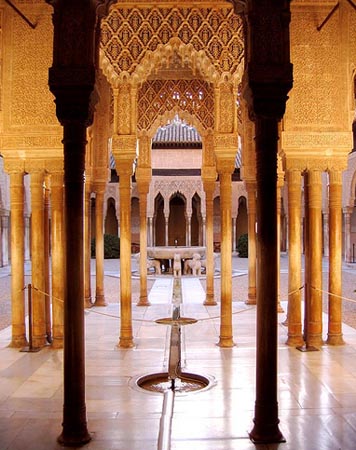
INSCRIPTION
IN THE ALHAMBRA
I
am a garden graced by every beauty :
See my splendor, then you
will know my being.
For Mohammad, my king, and in his name
The
hottest things, past or to come, I equal:
Of me, a work sublime,
Fortune desires
That I outshine all other monuments.
What
pleasure I provide for eyes to see!
In me, any noble man will take
fresh heart:
Like an amulet the Pleiades protect him,
The magic
of the breeze is his defender.
A shining dome, peerless, here
displays
Evident splendors and more secret ones.
Gemini extends
to it a touching hand,
Moon comes to parley, stars clustering
there
Turn no longer in the sky's blue wheel:
In the two
courts, submissively, they linger
To be of service to their lord,
like slaves.
It is no marvel that the stars should err,
Moving
across their marks and boundaries,
And are disposed to serve my
sovereign lord,
Since all who serve him glory in his glory.
The
palace portico, so beautiful
It bids to rival heaven's very
vault;
Clothed in a woven raiment fine as this
You can forget
the busy looms of Yemen.
See what arches mount upon its roof
And
spring from columns burnished by the light
Like the celestial
spheres that turn and turn
Above the luminous column of the
dawn.
Altogether the columns are so beautiful
That every tongue
is telling their renown;
Black the shadow-'darkened cornice
cuts
Across the fair light thrown by snowy marble;
Such
opalescent shimmers swarm about,
You'd say, for all their size,
they are of pearl.
Never have we seen a palace rise so high,
With
such a clarity, such expanse of outline;
Never did a garden brim
like this with flowers,
Fruits more sweet to taste or more
perfumed.
It pays the fee required of beauty's critic
Twice and
in two varieties of coin:
For if, at dawn, an early breeze will
toss
Into his hands drachmas of light galore,
Later, in the
thick of tree and shrub,
With coins of gold the sun will lavish
him.
What sired these kindred things ? A victory:
Still none
can match the lineage of the king.
The
poem is an inscription in the Alhambra.
Poem
from "Andalusian Poems" translated by Christopher Middleton
& Leticia Garza-Falcón; D.R. Godine, Pubisher, Boston, 1993.
Photo: the Lion Fountain in the Alhambra, RWFG
Timeline of al-Andalus
600-756
Christian Visigoths
756-929 Umayyad Emirate of Cordoba
756-788
Abd al-Rahman I conquers Southern Spain and establishes himself as
Emir of Cordoba
788-796 Hisham I
929-1016 Umayyad Caliphate
of Cordoba
976-1008 Hisham II
1008-1010 Berber Revolt
1010-1012 Hisham II restored
1016-1023 Hammudid
Dynasty
1023-1031 Umayyad return to power
1023-1026
Muhammad III
1026-1031 Hisham III
1039-1085 Taifas
1085-1145
Almoravids (Berber)
1147-1238 Almohads
1238-1492
Emirate of Granada
778-1492 Christian “Reconquista”
of Spain
Sources for the Collection
The
majority of the poems were copied from
"Andalusian
Poems" translated from the Spanish by Christopher Middleton &
Leticia Garzia-Falcón;
This post does not pretend to be
a critical literary essay on Andalusian poetry, a subject beyond my
expertise. I consulted the following literature and recommend it for
further reading:
"The
Dream of the Poem: Hebrew Poetry from Muslim and Christian Spain,
950-1492", Translated, Edited & Introduced by Peter Cole
"The
Literature of Al-Andalus", by Maria Rosa Menocal, Raymond P.
Scheindlin, Michael Anthony Sells
"Sunset
in the Gardens of al-Andalus", by M. Ikraam Abdu-Noor
"Medieval
Iberia: An Encyclopedia", by E. Michael Gerli, Samuel G.
Armistead, Published by Taylor & Francis, 2003
"Freethinkers
of Medieval Islam: and their Impact on Islamic Thought", by
Sarah Stroumsa
"The
Other Within: The Marranos: Split Identity and Emerging Modernity",
by Yirmiyahu Yovel